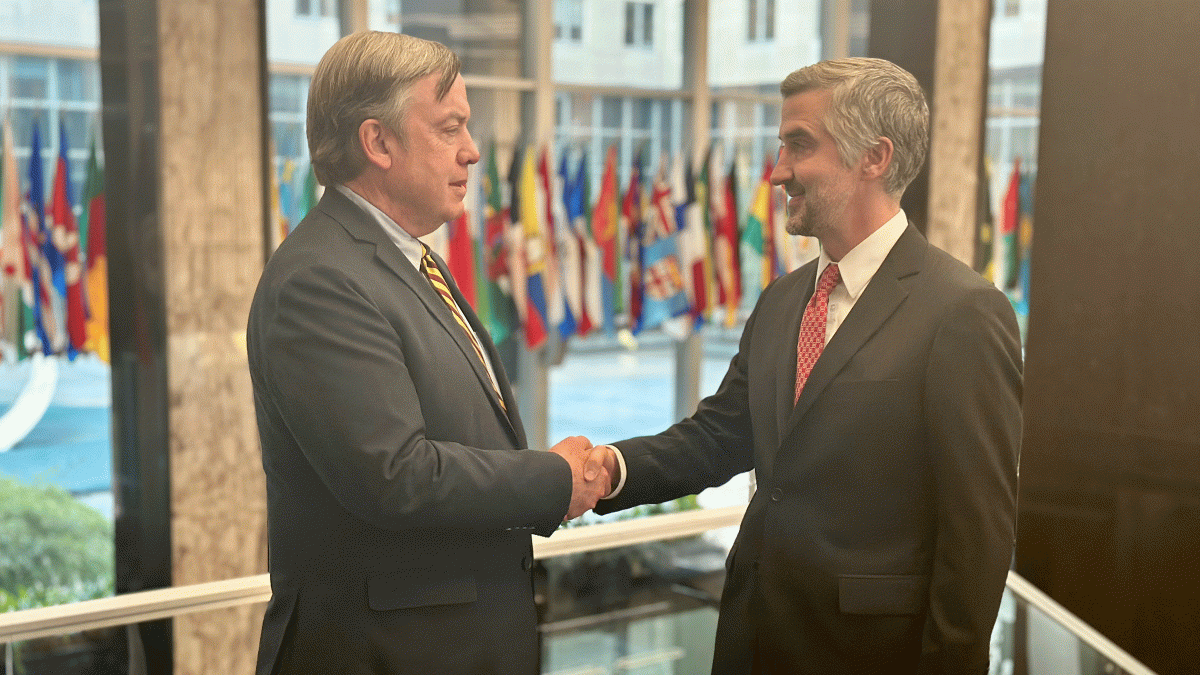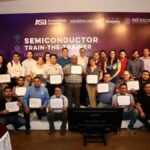University also signs new agreement with government ministries in Costa Rica

ASU President Michael Crow (left) shakes hands with Ramin Toloui, assistant secretary for the Bureau of Economic and Business Affairs at the U.S. Department of State, in Washington, D.C. Photo courtesy the U.S. Department of State
February 20, 2024
ShareFacebookTwitterLinkedInEmail
Well known by now is that the CHIPS and Science Act of 2022 was designed to re-establish semiconductor manufacturing, research and development in the United States — onshoring, as it is sometimes called. But a less well-known part of the CHIPS Act strategy is about establishing a resilient supply chain in countries America would regard as political and economic allies — known as “near-shoring” or “friend-shoring.”
It turns out that access and inclusion, central themes of the charter that guides Arizona State University, are also part of building the resilient international supply chain called for by the CHIPS and Science Act and critical to its long-term success.
This week, the U.S. Department of State’s Bureau of Economic and Business Affairs awarded a $13.8 million cooperative agreement to ASU under the International Technology Security and Innovation (ITSI) Fund, created by the CHIPS Act of 2022. This new initiative will bolster the assembly, testing and packaging capabilities in ITSI partner countries in the Americas and Indo-Pacific, enhancing a resilient supply chain for U.S. semiconductor manufacturers.
“The United States believes it is critical for our partners and allies to work together to diversify critical supply chains and collaborate on technologies of the future to support our shared economic growth, security and democratic values,” said Bureau of Economic and Business Affairs Assistant Secretary Ramin Toloui.
“No one country, including the United States, can produce or onshore everything it needs to manufacture semiconductors. As such, this collaboration with ASU is huge step for ITSI and our work to facilitate new investments that will complement U.S. chip production.”
This multiregional initiative, led by the State Department and ASU’s Ira A. Fulton Schools of Engineering and W. P. Carey School of Business supply chain faculty, marks the beginning of the next phase of the department’s ITSI-related efforts, builds on the ongoing ecosystem reviews and will contribute to the growth and diversification of the global semiconductor ecosystem. This initiative will help our ITSI partners create the investment environment to support the semiconductor industry and will bolster workforce capacity to create a pipeline of new talent. Through high-quality workforce development programs, this initiative builds workforce skills partners need to keep up with advancing technology, secure meaningful employment and contribute to economic growth and prosperity. The initiative will also allow U.S. semiconductor manufacturers to leverage improved supply chains and labor connections from around the world.
“We are honored to be selected by the U.S. Department of State to be its partner in this new initiative, and Arizona State University will put every ounce of its creativity and dedication to work to be of service in this role,” said ASU President Michael Crow.
“Building a workforce for the economy of today and the future is a complicated, cooperative effort that needs to occur in partnership with industry not only in the United States but also with international partners, and ASU looks forward to expanding on the work we have done in this area. There is much more to do.”
In August 2022, President Joe Biden signed the CHIPS Act of 2022, a U.S. law that appropriated new funding to boost domestic manufacturing and research of semiconductors in the United States. The CHIPS Act of 2022 created the ITSI Fund, which provides the Department of State with $500 million ($100 million per year over five years, starting in fiscal year 2023) to promote the development and adoption of secure and trustworthy telecommunications networks and ensure semiconductor supply chain security and diversification through new programs and initiatives with our allies and partners.
One of the countries targeted by the State Department is Costa Rica.
And just last week in Costa Rica, ASU signed a memorandum of understanding with the Ministry of Science, Innovation, Technology, and Telecommunications (MICITT) and the Ministry of Foreign Trade (COMEX). The agreement marks a crucial step toward competitiveness, talent development, innovation promotion and technological development in Costa Rica.
The agreement aims to provide Costa Rican institutions with guidance and support from ASU in designing technical and professional educational programs related to disciplines relevant to the technological industry value chain, such as microelectronics and semiconductors.
“The signing of the memorandum of understanding with Arizona State University is a significant milestone for the technological industry in Costa Rica,” said Minister of Science, Innovation, Technology and Telecommunications Paula Bogantes. “Exploring opportunities with ASU will enhance our capabilities, drive research and accelerate the development of solutions for this sector. This step reflects our firm commitment to position our country as a regional technological hub.”
Costa Rica Minister of Foreign Trade Manuel Tovar reaffirmed the impact this alliance will have on the global competition to attract investment to the country.
“This allows us to access Arizona State University’s knowledge, globally recognized for its advanced educational programs in emerging technologies and innovation. Specifically, Costa Rica is focused on creating a workforce that will strengthen and expand our semiconductor ecosystem, and this agreement will enable us to generate talent efficiently and expeditiously in collaboration with our academic institutions,” he said.
The memorandum of understanding proposes joint work with Costa Rican technical and professional training institutions through subsequent bilateral agreements; exploration of opportunities to create training programs with the most up-to-date, flexible and innovative practices; the search for funds to enable workforce generation in the field of semiconductors; and the identification of other areas of collaboration.
“This agreement underscores the shared commitment of the government of Costa Rica and Arizona State University to propel innovation, spur economic development and cultivate a highly skilled workforce in critical areas of advanced technology and innovation to support our national goal of diversifying and strengthening industry and its supply chain within the Americas,” said Jeffrey Goss, ASU’s executive director for the Office of Global Outreach and Extended Education. “The university is committed to being a resource for Costa Rica that helps drive education and helps to develop a workforce that supports industry and creates opportunity for people in search of a better future.”
Microelectronics SDG 09 Industry, Innovation and Infrastructure Staff Faculty Business Washington, D.C. Policymakers Science and technology International Technology Community Ira A. Fulton Schools of Engineering Office Of The President W. P. Carey School of Business



